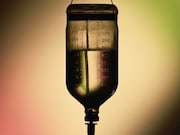No differences seen versus placebo in organ dysfunction scores, biomarkers of inflammation or vascular injury
TUESDAY, Oct. 1, 2019 (HealthDay News) — Compared with placebo, intravenous infusion of high-dose vitamin C does not improve organ dysfunction or alter markers of inflammation or vascular injury among patients with sepsis and acute respiratory distress syndrome (ARDS), according to a study published in the Oct. 1 issue of the Journal of the American Medical Association.
Alpha A. Fowler III, M.D., from Virginia Commonwealth University in Richmond, and colleagues randomly assigned 167 patients with sepsis and ARDS present for less than 24 hours in seven medical intensive care units to receive either intravenous infusion of vitamin C or placebo (84 and 83 participants, respectively) every six hours for 96 hours.
Sixty-two percent of the patients completed the study to day 60. The researchers observed no significant differences between the groups in the primary end points of change in mean modified Sequential Organ Failure Assessment score from baseline to 96 hours (3 and 3.5 points in the vitamin C and placebo groups, respectively; difference, −0.10; 95 percent confidence interval, −1.23 to 1.03; P = 0.86). There were also no significant differences noted in C-reactive protein levels (54.1 versus 46.1 µg/mL; difference, 7.94 µg/mL; 95 percent confidence interval, −8.2 to 24.11; P = 0.33) and thrombomodulin levels (14.5 to 13.8 ng/mL; difference, 0.69 ng/mL; 95 percent confidence interval, −2.8 to 4.2; P = 0.70) at 168 hours.
“Further research would be needed to evaluate the potential role of vitamin C for other outcomes in sepsis and ARDS,” the authors write.
Editorial (subscription or payment may be required)
Copyright © 2019 HealthDay. All rights reserved.








